When Men Stop Masturbating, Here's What Happens To Their Risk Of Erectile Dysfunction
Both masturbation and erectile dysfunction are rife with rumors. If you have a penis, it can feel like you're not really sure what the facts are for these two things.
For starters, erectile dysfunction, in which a person struggles to get and/or keep an erection, is very common. While age can play a big part in one's frequency of ED, there are many other issues that can contribute to it. Heart disease, diabetes, obesity, and high blood pressure are just a few factors, per the Mayo Clinic.
Masturbation, too, can have an effect on erectile dysfunction — but not in the way you may think. According to a 2018 survey by sex toy brand Tenga, 92% of American men masturbate. Despite this percentage, there are pesky rumors that suggest that masturbation can cause erectile dysfunction. Where the confusion seems to lie in regards to masturbation causing ED is likely due to the refractory period, in which someone needs a bit of downtime after ejaculation to get erect again and be able to function sexually.
"Recovery depends on age, how much arousal you get in between sessions, hormones, and your overall health," urologist Jamin Brahmbhatt, M.D. told Men's Health. "Studies have found teenagers can take minutes to recover, while men in their 30s and 40s can take 30-60 minutes or longer. There is no hard and fast rule on how quickly you will recover." In other words, that's not masturbation causing ED; it's your body needing a time out.
If anything, when you stop masturbating, you increase your risk of erectile dysfunction. Not just because of the physical impact of not masturbating, but the mental impact too.
Masturbation helps prevent erectile dysfunction by strengthening the pelvic floor
Masturbation isn't just normal and natural, it's healthy for the body. No matter your gender or sexuality, masturbation has a whole boatload of benefits. Like sex, it's a great way to exercise the pelvic floor and a strong pelvic floor could be the key to preventing erectile dysfunction, as well as incontinence.
According to a 2021 study published in Scientific Reports, when the ischiocavernosus and bulbocavernosus muscles in the pelvic floor are exercised regularly, they result in increased pressure in the intracavernous, an interior part of the penis, that encourages it to become hard. As the 2021 study also noted, other research found that a weak pelvic floor was the cause of erectile dysfunction in some.
Because of this, you may not want to stop masturbating. If every time you masturbate is an opportunity to exercise those specific muscles, then you're more likely to not only keep erectile dysfunction at bay but maybe even find yourself knee-deep in erections too.
Masturbation can help erectile dysfunction from a mental standpoint too
If you stop masturbating, you're not only giving up regularly strengthening your pelvic floor, but mentally, masturbation helps with erectile dysfunction too. While there are certain health-related ailments that can cause erectile dysfunction, for some, their ED is the result of psychological issues like stress, depression, and anxiety — performance anxiety too. But if you're able to get and keep an erection during masturbation, then there's a good chance that you'll be able to do the same when having partnered sex, because the confidence that you can sexually perform is there, even if it just happens to be in the back of your mind, per WebMD.
Ultimately, when you stop masturbating there's a good chance you're going to run into a lot of different side effects that you didn't think possible. And one of them just might be increasing your risk of erectile dysfunction. While there's certainly no shame in occasionally having to deal with ED, if you can avoid it by masturbating on a regular basis, then why wouldn't you?
Of course, if your reason for wanting to give up such a beloved pastime is because you fear you're doing it too much or that you might be addicted, then that's a whole other situation. If that's the case, then you need to address it with your doctor.


